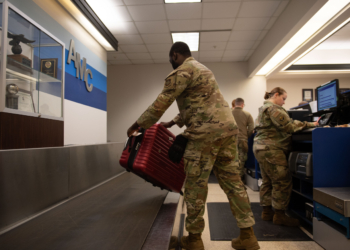Everyone wants to go on a summer vacation. Unfortunately, many military families stress over planning and budgeting, especially if kids are involved. According to Gregg Murset, co-founder & CEO of BusyKid, children should be involved in trip planning.
“Almost nothing teaches time management, accountability, responsibility, patience, unselfishness, navigation, decision-making, and money management better than planning a trip,” Murset said.
Murset is a father of six, a certified financial planner, and an advocate for teaching kids financial literacy. BusyKid provides kids with debit cards alongside a chore app to educate them on the importance of spending, saving, investing, and sharing.
Involving kids — especially younger ones — in trip planning and budgeting is complicated. But Murset says he believes these teachable moments far outweigh the inconveniences.
“When [teachable moments] come along, parents need to pounce on them,” he said. “Getting kids involved in planning and budgeting for a trip gives them a say on where to go and how much they can spend. If the place is a bust or they overspend or spend on something useless, it’s a great time for a conversation about their decisions, not I told you so.”
Murset shares tips to make budgeting and planning for a trip with children a little less stressful.
Communication is key
It’s about getting kids to think ahead, Mursett said. If the idea of travel is brought up, include the kids. Discuss plans with them. Depending on age, kids can be involved in all aspects of planning. Be realistic and check in with your entire family often.
Create deadlines
Kids need structure. They need goals and direction, especially when navigating finances. These skills are imperative to success at any age. Children need to recognize from a young age that planning saves time and money.
Murset recommends using a calendar somewhere visible so everyone can follow along.
“The toughest part is getting started far enough ahead to take advantage of special pricing and advance tickets, thinking of everything, and sticking to the plan. Make sure everyone in the family provides input.”
Don’t be the kids’ ATM
Let kids earn money for the trip. What they earn, they get to spend. Don’t let them withdraw money from you. This isn’t a long-term or reasonable plan. Be creative. Allow them to earn money for the trip. This teaches important and practical life skills.
BusyKid is especially helpful for this trip-planning aspect.
“When the trip starts, all the funds available are in the system (bank), and then if the kids were to buy something, they move money to their card. The best part is that parents get to approve money being added and can monitor all transactions,” Murset says.
Know that things change
As with anything, things change. Flexibility is not only a relevant skill for military life, but one children learn as they grow.
“Tell everyone to expect the unexpected and roll with it,” Murset shares.
Involving your children in planning a trip can save time and money. Using skills like time management, budgeting, map reading, cooperation, and scheduling, military families can enjoy their travels while instilling valuable life skills in their children.
“Whether it’s planning or budgeting kids can learn skills including time management, broad-thinking, creativity, money management, map reading (or map app reading), travel schedules (whether transportation or show schedules at theme parks), cooperation, and possibly, car maintenance.”
Read comments










































